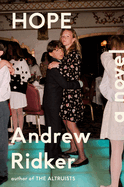
Does a commitment to doing good deeds entitle a person to some ethical leeway? The question is teased in Hope, Andrew Ridker's loving and hilarious satire of liberal pieties, starring the Greenspans of Brookline, Mass., who--despite seeming to have it all--make choices that risk it all for that elusive American-branded commodity: happiness. Scott Greenspan has a successful cardiology practice. His wife, Deb, approaches political activism through her synagogue with the single-mindedness with which she used to approach parenting. Like Scott and Deb, their grown children are dedicated to meaningful work: one is pre-med, and the other has a job in publishing. "You're the Greenspans, for God's sake. This kind of thing doesn't happen to people like you," Scott's friend Marty says after Scott confesses that Deb has convinced him to embark on an open marriage. One can only imagine Marty's bewilderment if he knew that Scott was personally profiting by fudging data in a clinical trial.
Set in the latter years of the Obama presidency, at the height of what one character calls "Starbucks capitalism," Hope shares the perspectives of each of the four Greenspans, all of whom face crises of conscience and take Olympian-level leaps at self-justification. (As Scott sees it, "It was hard to feel as though he had transgressed; surely, any rule worth taking seriously would be more difficult to break.") Ridker (The Altruists) may have written the novel of early-21st-century liberal idealism, haunted as Hope is by the disillusionment that almost inevitably follows too-high expectations. --Nell Beram, author and freelance writer

